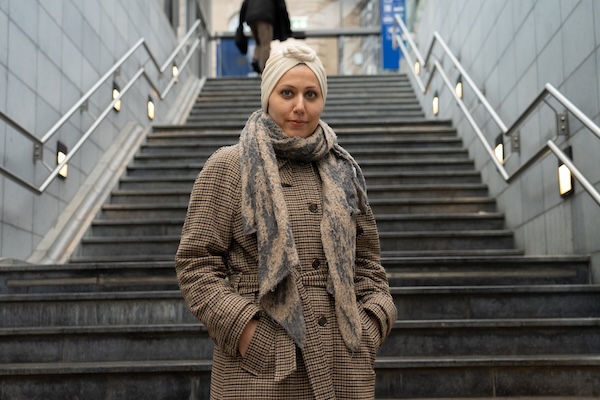 Hala Alkasem;
Credit: Ali Sahib, Chronicle.lu
Hala Alkasem;
Credit: Ali Sahib, Chronicle.lu
Following the fall of Bashar al-Assad's regime in Syria, various European countries including Luxembourg announced their decision to pause the processing of asylum applications from Syrians.
For more on Luxembourg’s decision, see https://chronicle.lu/category/at-home/52576-luxembourg-temporarily-suspends-asylum-applications-from-syrians
In light of the current situation, Chronicle.lu reached out to Syrians living in Luxembourg to learn about their experience and their thoughts on this decision. Among them is Hala Alkasem, whose journey has not been without its challenges but for whom Luxembourg has become a second home.
Chronicle.lu: Please tell us about your background (e.g. hometown, profession in Syria), what brought you to Luxembourg and when (how long you have been living here).
Hala Alkasem: My name is Hala, I am 37 years old, and I am from Syria. I worked as an Arabic language teacher for middle and secondary school students from 2007 to 2014. When the war began in Syria, the situation went from bad to worse. Due to these changes and the ongoing events in my country - and because I lost two of my brothers, one to indiscriminate airstrikes that hit our area and the other who was forcibly disappeared in Assad regime prisons - and because my city was under severe siege along with constant fighting and bombing, my husband and I decided to save our lives and flee Syria, especially as I was four months pregnant at the time. I arrived in Luxembourg at the end of August 2015, and in December of that year, I gave birth to my twin children, Adam and Dima. In 2017, I was blessed with another daughter, Amal.
Chronicle.lu: How long did it take to receive Luxembourgish residency/nationality and/or asylum status? How was this process (long/short, easy/difficult) in your experience?
Hala Alkasem: In less than six months, I was granted political asylum, and in 2021, my family and I proudly obtained Luxembourgish citizenship. Overcoming this phase was not easy due to the war conditions we endured, and the psychological toll played a significant role. Additionally, I faced challenges in learning the languages of the country. I had to learn both Luxembourgish and French, as Luxembourg is a multilingual country. However, in the end, I managed to achieve this, starting from scratch and continuing until I reached my goal - and I am still striving.
Chronicle.lu: Please share a bit about your experience living in Luxembourg. Have you managed to find employment? If so, what do you currently do? Was it easy or difficult to find employment here? How about integration- were there any challenges in this area?
Hala Alkasem: I hold a university diploma in literature and humanities, specialising in Arabic language. I was able to get my degree recognised by the Ministry of Higher Education. In addition, I speak French. I went from being a woman who knew nothing but "Bonjour" and "Moien" to fully integrating into the job market as a translator at a centre for asylum seekers - a dream I had since I first arrived here. Finding this job opportunity was not easy, but I believe that whoever strives can achieve, and this is my principle. I now work as a translator and socio-cultural facilitator (traductrice et animatrice socio-culturel).
I did not face any difficulty integrating, thanks to the diversity and inclusion in Luxembourg. The Luxembourgish society is open to others, so I did not experience any form of difficulty or racism at all. On the contrary, the Luxembourgish people are accepting of others regardless of their sect, race or religion. Wherever I go, I find people who help or support me.
Chronicle.lu: In December 2024, Luxembourg's authorities (and those of other European countries) announced they would temporarily suspend the processing of international protection (asylum) applications from Syrian nationals, following the fall of Bashar al-Assad's regime. Has this decision had an impact on you or someone you know (if so, in what way)?
Hala Alkasem: This decision had a significant impact - not necessarily on me, but on everyone I meet. I saw fear of the unknown future in their eyes. Some people are afraid of deportation decisions, others fear the suspension of family reunification processes, while others have not yet had the chance to obtain residency or are worried about indefinite delays for their ministry interview appointments. These concerns and more are the reality that most Syrians live with now.
Chronicle.lu: Would you consider / are you currently considering returning to Syria in light of the regime change and transition? Why/why not?
Hala Alkasem: At the moment, I am not considering returning to Syria for several reasons. One of them is that my father and mother passed away while I was here, and I couldn't even bid them farewell, which hurts me deeply. I cannot imagine returning to my home and not finding them there. The most important reason is that I have truly started my life from scratch here and reached an important point that I cannot afford to step back from. My three children are in school, fluent in Luxembourgish, German and French, and excelling academically. Moreover, they do not know Syria and are not even registered there. For me, I do not want to risk even one percent of their places, stability and future.
Therefore, under the current circumstances, even the idea of visiting Syria is out of the question for me. I feel that I belong to my second homeland, Luxembourg, and I would like to express my heartfelt gratitude to Luxembourg, my country and my children's country. Thank you as well for giving me this opportunity to express my love and sense of belonging to this country.








